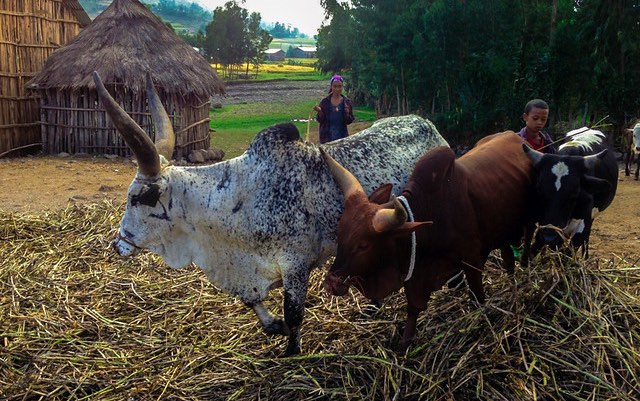Even as Ethiopia has undergone a rapid economic transformation in recent years, its impoverished rural areas run the risk of being left behind. On May 2, 80 stakeholders from donor agencies, government institutions, civil society, and local NGOs met in Addis Ababa to explore this challenge—and how to apply strategies for rural revitalization outlined by IFPRI’s 2019 Global Food Policy Report. The event was organized by IFPRI, Compact 2025, the Ethiopia Policy Studies Institute (PSI), and the UN Development Programme (UNDP).
Afeikhena Jerome of the African Union Commission noted that Africa is still basically rural, with the rural population of Africa south of the Sahara declining from 69% in 1990 to 61% in 2016, according to the World Bank’s World Development Indicators. Rural revitalization is thus key to Africa’s structural transformation as well as achieving the UN Sustainable Development Goals (SDGs) and Africa Agenda 2063 – The Africa We Want.
In Ethiopia, a recent analysis (based on the national household consumption expenditure surveys of 2011 and 2016) shows that monetary living standards of rural households remain low and that consumption growth in rural areas has lagged significantly behind urban areas. Moreover, real consumption of the bottom quintile did not change, indicating that the poorest have been excluded from the country’s ongoing transformation process, leading to rising economic inequality.
Further transformation of Ethiopia’s economy will be crucial to reduce poverty, said State Minister of the Ministry of Finance Eyob Tekalign. Better water management and more investments in irrigation are needed to stimulate agricultural transformation in rural areas, he added.
The majority of Ethiopians live in rural areas where people still have to walk long distances to reach urban areas; presenters urged more investments in road construction and in other forms of infrastructure.
Business as usual will not be enough to overcome obstacles the poorest face, said Fanaye Tadesse of IFPRI’s Ethiopia Strategy Support Program (ESSP) and PSI. These include limited education; high numbers of dependents per household; not enough calories per capita per day; high levels of child stunting; a lack of women’s empowerment; and the absence of modern agricultural inputs and other farming practices. Better-targeted programs and solutions that focus on overcoming these constraints are required, she said.
According to a study of the poor and rural jobs in Ethiopia’s transforming economy presented by Fantu Bachewe, off-farm income makes up 18% of the total income of rural households. This type of income is especially important for the poor, youth, and female-headed households; stimulating the Ethiopian non-farm sector is therefore important to help these vulnerable groups.
Nahume Yadene is a Program and Administrative Manager with IFPRI’s Development Strategy and Governance Division (DSGD); Bart Minten is a DSGD Senior Research Fellow. They are with IFPRI’s Ethiopia Strategy Support Program in Addis Ababa.
You can find all the presentations from the conference here.







